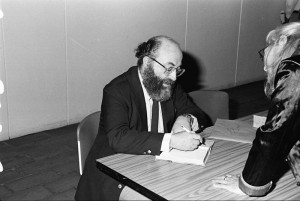
A few weeks ago, my friend and colleague Nan Thomas got in touch with me, wanting to discuss Chaim Potok’s 1972 novel My Name Is Asher Lev. According to Nan, I had once recommended this book for discussions of calling and vocation among faculty and graduate students. I couldn’t remember making that recommendation, but it made perfect sense to me —the novel had served that exact role in my Christianity and the Arts degree at Regent College.[1. Many thanks to Loren Wilkinson, Maxine Hancock, and Dal Schindell for introducing me to this book.].
In addition to her role with InterVarsity Faculty Ministry, Nan also works for the Center for Faculty Development at Union University, and she had just finished reading My Name Is Asher Lev with a group of Union faculty. My conversation with Nan confirmed that this novel can be a powerful resource for considering calling and vocation.
My Name Is Asher Lev
If you haven’t read this wonderful novel, let me start by providing some context. I’ll do my best not to give away any of the important plot points, in case you want to read it yourself (as, of course, you should).
Chaim Potok, who passed away in 2002, was an American Jewish novelist (and, briefly, Army chaplain) who wrote several critically acclaimed novels about the world of American Judaism. Set in Brooklyn during in the 1950s and 60s, My Name Is Asher Lev follows a Hasidic boy (and later young man) named Asher Lev, whose artistic gifts and desire to become an artist creates problems within his family and their tight-knit, highly religious community.[2. Asher and his family belong to a fictional Brooklyn-based “Ladover” movement of Jews, which was based on the real-life Lubavitcher Hasidic movement.] Asher’s parents, Aryeh and Rivkeh, work for the Rebbe (the leader of the community) by rescuing and relocating Jews from the Soviet Union and other Communist countries and, later, by establishing Hasidic communities throughout Europe.
Within their community, art is viewed by many as, at best, a frivolous hobby and, at worst, the work of the devil. (Later in the book, we’re introduced to Jacob Kahn, a Jewish painter and sculptor whose rise in the art world coincided with his rejection of traditional Jewish practices. Jacob’s lack of faith, and the overtly Gentile art world he inhabits, influences the view among Asher’s community that art is not a vocation for a “good Jew.”) Asher’s father, Aryeh, wants him to give up on art and focus on more serious —more important —work (like his own). It soon becomes apparent, however, that Asher is an artistic prodigy, with the potential to become the next Picasso or Chagall. Further, Asher finds it impossible to not draw or paint, even to the point of suffering physically when he tries to give up art[3. I wonder if this is intended to echo Jeremiah 20:9.].
As I reread My Name Is Asher Lev, I found the novel as powerful as I remember, and several important truths about calling were brought home to me once again.
Calling Is a Gift from God
The place God calls you to is the place where your deep gladness and the world’s deep hunger meet. – Frederick Buechner
Very few of us are gifted in the manner of Asher Lev, who astonishes the most jaded artists and collectors with his surprising talent. But whatever gifts we have, whatever opportunities we have, are gifts from beyond ourselves.
Sometimes, these gifts are not what we or others desire. Asher’s father is repeatedly disappointing that his son is not a better student, particularly in the subjects that would enable him to follow in his own diplomatic footsteps. Asher, though, can’t reject his artistic gifts any more than he could reject his own self.
Calling Is Unique as Every Individual

Much of the book’s tension comes from the conflicting desires of Asher and his father Aryeh. When I first read the book, in my early 20s, I saw Asher’s father as a bully, too stubborn and blind to see his own son’s greatness. This time around —when I am actually older than Aryeh at the novel’s beginning —I was struck by how important and meaningful his work is. He is rescuing Jews from Stalin’s gulags. Several times, when secondary characters learn Aryeh’s occupation, they pause and comment on the importance of his work and what a good man he is.
In his conflict with Asher, however, he can’t see that other callings can also be important, and that a desire to go in a different direction is not a condemnation of his own calling. Midway through the book, Asher (now about 13) is summoned to a private meeting with the Rebbe, essentially to find out the direction of the rest of his life. The Rebbe tells him,
A life should be lived for the sake of heaven. One man is not better than another because he is a doctor while the other is a shoemaker. One man is not better than another because he is a lawyer while the other is a painter. A life is measured by how it is lived for the sake of heaven.
It’s not the occupation that matters, but the purpose behind the occupation.
Calling Comes in Relationship with a Community
The Rebbe’s very next comment to Asher, though, is a reminder that “honor your father and mother” is one of the Ten Commandments. Even though his father doesn’t understand or respect Asher’s calling, he is still Asher’s father, and rejecting him would have tremendous consequences.
Part of the beauty of Potok’s writing is how he depicts the community surrounding Asher, even when Asher himself is unaware of it. His actions impact everyone around him to some degree, threatening to interfere with his parents’ important work, but his calling is also nurtured by the community. He is introduced to oil paint by a Russian émigré who sells office supplies; the Rebbe makes arrangements behind the scenes to aid Asher’s education; Asher comes full circle by the end of the book be becoming a beneficiary himself of his parents’ work abroad.
Calling also derives its meaning from the community. For Asher’s parents, their work to rescue Soviet Jews is rooted in their love for family, both immediate and extended. As his art develops, Asher repeatedly returns to the material of his tradition and his family history.
A calling that ignores our responsibilities to others is not a calling “lived for the sake of heaven.” Asher’s parents feel this keenly; their lives are haunted by their awareness of their obligations to Jews overseas and to members of their own family who sacrificed everything for their sake. The art world that Asher enters is a world that values the “personal vision” of an artist, almost above all else. To discover his true calling and his true art, Asher has to learn how to honor his art, his family, and his community.
Calling Requires —and Redeems —Suffering
Even if you haven’t read the novel, you may well be thinking that the process described above sounds difficult. And it is. Both Asher and his parents must make difficult decisions as they repeatedly find the vocational aspect of their calling in conflict with their responsibilities to family, friends, the Jewish community, and God.
Asher’s mother, in particular, feels torn between her husband and her son, and it’s her suffering that provides the novel with its most powerful image. I won’t spoil the ending for those of who haven’t read the book, but Asher’s journey, in large part, deals with the struggle to find redemptive meaning in this fallen and broken world—or, rather, to shed light on the redemption that God is bringing into the world.
Questions for Discussion
- Have you read My Name is Asher Lev? What are your thoughts on Potok’s treatment of vocation and calling in the novel?
- What is your take on the aspects of calling that I have outlined above?
- Are there other novels or movies that have informed your views on vocation and calling?
The former Associate Director for the Emerging Scholars Network, Micheal lives in Cincinnati with his wife and three children and works as a web manager for a national storage and organization company. He writes about work, vocation, and finding meaning in what you do at No Small Actors.

Leave a Reply